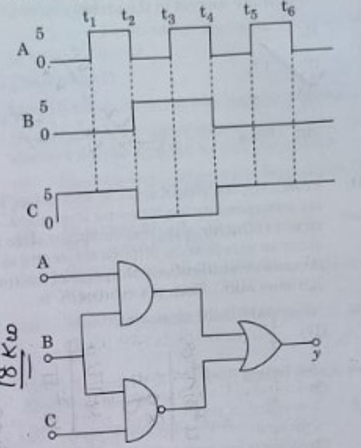A digital signal possesses:
A
continously varying values
B
only two discrete values
C
only four discrete values
D
none of the above
Text Solution
The correct Answer is:B
|
Topper's Solved these Questions
- SEMICONDUCTOR AND DEVICEBOOK - FIITJEECHAPTER - SEMICONDUCTOR AND DEVICEEXERCISE - ASSIGNMENT PROBLEMS( objective : Level-II)
37 Videos
- SEMICONDUCTOR AND DEVICEBOOK - FIITJEECHAPTER - SEMICONDUCTOR AND DEVICEEXERCISE - SOLVED PROBLEMS Objective: Level-I
20 Videos
- SEMICONDUCTOR AND DEVICEBOOK - FIITJEECHAPTER - SEMICONDUCTOR AND DEVICEEXERCISE - ASSIGNMENT PROBLEMS(Subjective: Level-I)
40 Videos
- ROTATIONAL MECHANICSBOOK - FIITJEECHAPTER - ROTATIONAL MECHANICSEXERCISE - COMPREHENSION - IV
2 Videos
- SIMPLE HARMONIC MOTIONBOOK - FIITJEECHAPTER - SIMPLE HARMONIC MOTIONEXERCISE - Assignment Problems (Objective) (Level-II)
20 Videos
Similar Questions
Knowledge Check
Digital signals
ADo not provide a continuous set of valuesBUtilize binary systemsCEnsures error and noise free communicationDAll of theseExamples of digital signals is/are
Aoutput of a digital computerBFAXCletter printed in a bookDmusicAssertion: Digital signals are continous variations of voltage of curren t.
Reason: Digital signals are essentially single valued functions of time.AA and R both are true and R is correct explaination of ABA is correct but R is wrongCA is wrong but R is trueDBoth are wrong
(A) : Digital signals are preferred to analog signals for transmission of information.
(R) : Analog signals require amplification and correction at suitable intervals.
View SolutionFor given circuit the input digital signals are applied at terminal A,B, C. What would be output at terminals?

View SolutionHow are analogue and digital signals different
View SolutionDistinguish between 'Analog and Digital signals'.
View SolutionWhat is meant by digital signal ?
View Solution
